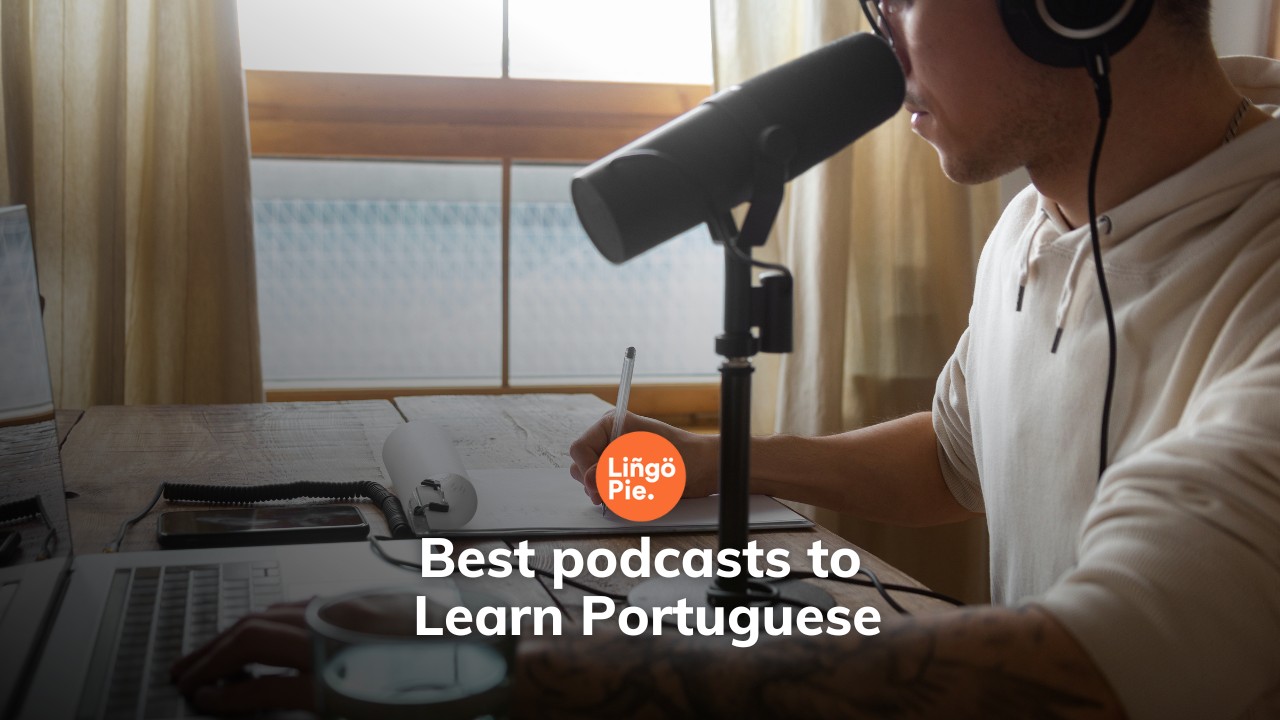Learning Portuguese can open doors to new cultures, career opportunities, and personal enrichment. Are you wondering How Do I Learn Portuguese effectively? This comprehensive guide from LEARNS.EDU.VN provides proven strategies, from immersing yourself in Portuguese media to mastering grammar with language learning tools. Discover how to learn Portuguese and unlock a world of linguistic possibilities with the aid of Portuguese language learning apps, language exchange partners, and the best online resources.
1. Is Portuguese Difficult to Learn?
Many people ask, “Is Portuguese hard to learn?” Fortunately, Portuguese is considered a Category I language by the U.S. Foreign Service Institute, meaning it’s among the easiest for English speakers. It typically requires about 575-600 hours of study to achieve fluency, similar to French or Spanish. This is because English shares approximately 3,000 cognates (words with similar origins and meanings) with Portuguese.
However, while Portuguese shares similarities with English, it also presents unique challenges:
- Pronunciation: Portuguese is not entirely phonetic. The written form doesn’t always directly correspond to the pronunciation, which can make it challenging to master the correct sounds.
- False Friends: Numerous words look similar to English words but have different meanings (e.g., “balcão” means counter, not balcony). Recognizing these false friends is essential to avoid miscommunication.
- Verb Conjugations: Portuguese verb conjugations are complex, with numerous forms based on tense, mood, and person. Mastering these conjugations is vital for accurate sentence construction.
Despite these challenges, the overall consensus is that Portuguese is quite accessible for English speakers, particularly those with experience in other Romance languages.
2. Getting Started: Your First Steps in Portuguese
Embarking on your Portuguese learning journey requires a strategic approach. Here’s how to get started effectively:
-
Choose Your Variant: Decide whether you want to focus on Brazilian Portuguese or European Portuguese. While mutually intelligible, these variants differ in pronunciation, vocabulary, and some grammar rules. Brazilian Portuguese is spoken by over 200 million people and has a more open pronunciation. European Portuguese, spoken in Portugal, is more formal and has a more nasal pronunciation.
-
Set Realistic Goals: Instead of indefinitely postponing your start, commit to learning Portuguese today. Set achievable daily or weekly goals to maintain motivation and track your progress.
-
Consistency is Key: Dedicate a specific time each day, even if it’s just 30 minutes, to Portuguese study. Consistent, regular practice is more effective than sporadic, lengthy sessions.
-
Start Simple: Begin with the present tense and essential, everyday vocabulary. Build a solid foundation before tackling more complex grammar and tenses. Even with limited vocabulary and verb conjugations, you can begin to communicate effectively.
To stay motivated, join online communities, utilize social media resources, and engage with Portuguese content. LEARNS.EDU.VN also provides a range of resources and courses tailored to various learning styles and proficiency levels.
3. Eight Proven Tips for Learning Portuguese Effectively
Here are eight strategies to enhance your Portuguese learning journey:
3.1. Immerse Yourself in Portuguese TV Shows and Movies
One of the most engaging and effective methods for reinforcing your Portuguese skills is through immersion in native television, movies, and video content. This approach provides multiple benefits:
- Ear Training: Develop your ability to understand natural pronunciation, intonation, and speech patterns.
- Exposure to Idioms and Slang: Familiarize yourself with common idioms, slang, and conversational phrases used in everyday contexts.
- Cultural Context: Gain insights into cultural nuances, nonverbal cues, and social customs that are essential for effective communication.
Start with beginner-friendly content that offers subtitles in Portuguese. Reading along with the subtitles can help you connect spoken words with their written forms. As your proficiency increases, transition to watching without subtitles to challenge your listening comprehension skills.
Remember to choose content that aligns with your preferred variant, whether Brazilian or European Portuguese. This will ensure you are learning the specific accents, vocabulary, and cultural references relevant to your goals.
Platforms such as Netflix, YouTube, and language learning apps provide access to a wide array of shows, movies, and news programs that can supplement your studies. For instance, Lingopie offers interactive features that enhance your learning experience by allowing you to engage actively with the content.
Consistency is key. Make Portuguese video immersion a regular part of your routine for maximum retention and improvement.
3.2. Listen to Portuguese Music Regularly
Incorporating Portuguese music into your daily routine is an enjoyable and effective way to reinforce your listening skills and pronunciation. The rhythmic patterns and melodies help information stick in your brain, making it easier to remember new words and phrases.
- Create Diverse Playlists: Compile playlists of Portuguese songs from various genres that appeal to your taste.
- Active Listening: When possible, listen actively by reading along with the lyrics. This practice enhances your reading comprehension and reinforces vocabulary.
- Sing Along: Improve your oral fluency, accent, and speech patterns by singing or rapping along with the music.
- Explore Artists’ Origins: Pay attention to the origins of the artists to differentiate between Brazilian and European Portuguese accents and musical styles.
Music serves as a motivating and memorable tool that enhances your language studies. You’ll absorb new vocabulary, idioms, and grammar structures naturally through repeated listening.
Popular Artists:
| European Portuguese | Brazilian Portuguese | |
|---|---|---|
| Artists | Mariza, António Zambujo, Deolinda | Caetano Veloso, Gilberto Gil, Marisa Monte |
| Genre | Fado, Contemporary Pop | Samba, Bossa Nova, MPB |
| Cultural Emphasis | Tradition, Nostalgia | Rhythm, Social Commentary |
| Vocabulary and Pronunciation Style | Formal, Nasal | Informal, Open |







Begin with popular, contemporary hits for an accessible entry point, then explore regional styles such as funk, fado, samba, and bossa nova. The more you immerse yourself in the diverse rhythms and lyrics of Portuguese music, the more your comprehension and overall fluency will improve.
3.3. Read Portuguese Books and Articles
Reading is an essential practice for building your Portuguese vocabulary and solidifying your understanding of grammar rules. Unlike listening exercises, reading allows you to proceed at your own pace and revisit material as needed.
- Start with Beginner Materials: Begin with children’s books, short stories, and adapted novels. These resources use simpler language and provide a solid foundation for more advanced reading.
- Progress Gradually: As your skills improve, advance to young adult novels, magazines, newspapers, and eventually, advanced literature.
- Read Aloud: Practice pronunciation and cement new words by reading aloud whenever possible.
- Note New Vocabulary: Keep a notebook to jot down unfamiliar words and phrases for later study.
- Focus on Overall Meaning: Avoid getting bogged down by looking up every single unknown word. Prioritize comprehending the overall meaning of the text.
Make reading a consistent habit. Even 15-30 minutes per day will expose you to context-rich examples of vocabulary, idioms, and grammar in action, reinforcing your skills more effectively than memorizing isolated words.
Mix up your reading sources, including literature, periodicals, and websites, to experience different styles and expand your linguistic horizons. The more Portuguese text you consume, the more your comprehension will improve.
3.4. Listen to Podcasts and Audiobooks in Portuguese
Listening to podcasts and audiobooks is an excellent method for familiarizing yourself with spoken Portuguese, particularly if you do not live in an environment where you can regularly interact with native speakers.
Podcasts featuring native speakers will expose you to colloquialisms, slang, and humorous phrases, enriching your understanding of the language. Moreover, many podcasts offer insights into Portuguese history, culture, and customs, providing valuable cultural context alongside language practice.
Keep a record of common colloquial phrases encountered in podcasts and make an effort to use them in real-life situations. This active application will solidify your learning and make your speech sound more natural.
3.5. Find a Language Exchange Partner for Practice
Conversing with native speakers is vital for developing your listening comprehension and speaking skills. A language exchange partner offers an affordable means of practice through mutual learning.
A language exchange partner is typically a native speaker of Portuguese who is learning your native language. You both dedicate time to practice each other’s languages, providing mutual support and correction.
- Find Partners Online: Search online communities (e.g., Reddit, Meetup, Conversation Exchange) for individuals learning your native language.
- Establish a Regular Schedule: Set a regular schedule to divide time practicing each language (e.g., 30 minutes in Portuguese, 30 minutes in English).
- Engage in Conversational Topics: Discuss everyday topics, ask each other questions, and correct mistakes in a supportive manner.
- Consider a Tutor: For beginners, consider hiring a tutor to build foundational conversational skills.
Choose your partner strategically:
- Match Variant Preference: Select partners who speak your target variant (Brazilian or European Portuguese).
- Find the Right Level: Look for partners who are at or slightly above your skill level to ensure productive conversations.
- Utilize Voice and Video Chat: Use voice or video chat for maximum speaking and comprehension practice.
3.6. Enroll in Portuguese Language Classes
If you prefer structured learning with qualified instruction, consider enrolling in Portuguese lessons. Many teachers offer classes via Zoom or similar video conferencing platforms, allowing you to study from the comfort of your home. Alternatively, you can search for local in-person classes.
If you find self-study challenging, a classroom environment can provide the necessary support and accountability.
Different teaching methods are available, so find a class that aligns with your learning style. Some teachers may conduct the class entirely in Portuguese, while others will explain concepts in English.
Your teacher should ideally be a native speaker or, at the very least, a highly proficient second-language speaker. This ensures you receive accurate pronunciation guidance and avoid developing incorrect habits.
In class, you can practice pronunciation with immediate feedback from the instructor, helping you to refine your accent and improve your speaking skills.
3.7. Utilize Language-Learning Apps for Reinforcement
Incorporate language-learning apps into your routine to supplement your learning. These apps are valuable resources for learning Portuguese online, often offering free or low-cost options. Apps typically present lessons in a gamified format, making learning fun and engaging.
Language-learning apps can help you learn phrases, verb tenses, basic greetings, and verb conjugations. Committing to even five or ten minutes of practice daily with an app will keep you motivated and reinforce your learning.
Notable Language Learning Apps:
| App | Features | Pricing | User Experience |
|---|---|---|---|
| Duolingo | Gamified lessons covering vocabulary, grammar, and pronunciation. Includes a streak system to encourage daily practice. | Free/Premium | Fun and engaging for beginners. Can be repetitive at higher levels. |
| Memrise | Focuses on vocabulary acquisition through spaced repetition and mnemonics. Offers user-created courses. | Free/Premium | Effective for memorizing words and phrases. Offers diverse content. |
| Babbel | Structured courses designed by language experts. Covers grammar, vocabulary, and cultural insights. | Subscription | Well-structured and comprehensive. Suitable for learners who prefer a systematic approach. |
| Rosetta Stone | Immersion-based learning with a focus on pronunciation. Uses images and audio to teach vocabulary and grammar. | Subscription | Natural and intuitive. Can be expensive compared to other options. |
| Lingopie | Learn through watching TV shows and movies with interactive subtitles and learning tools. Focuses on real-world language exposure. | Subscription | Engaging for visual learners. Combines entertainment with language education. |
| HelloTalk | Connects you with native speakers for language exchange. Offers text and voice chat features, as well as correction tools. | Free/Premium | Great for practicing speaking and writing. Facilitates cultural exchange and real-time feedback. |
| Anki | Flashcard program that uses spaced repetition to help you memorize vocabulary and grammar. Highly customizable and versatile. | Free (Desktop) | Powerful and adaptable. Requires time to set up but highly effective for long-term retention. |
| italki | Platform to find professional language tutors for online lessons. Offers personalized instruction and feedback. | Pay-per-lesson | Personalized and effective. Provides tailored instruction based on your learning needs and goals. |
| Tandem | Language exchange app that connects you with native speakers for real-time practice. Includes voice and video chat, as well as text correction tools. | Free/Premium | Great for improving conversational skills. Facilitates spontaneous and natural language practice. |
| Busuu | Short, interactive lessons covering vocabulary, grammar, and pronunciation. Offers personalized study plans. | Free/Premium | Concise and effective for busy learners. Provides structured lessons and progress tracking. |
| Drops | Visual vocabulary learning app that uses fast-paced games to help you memorize words. | Free/Premium | Fun and engaging for visual learners. Limited to 5 minutes of free practice per day. |
| Clozemaster | Learn vocabulary in context by filling in the missing words in sentences. Offers a wide range of language pairs and difficulty levels. | Free/Premium | Effective for expanding vocabulary and understanding sentence structure. |
| LingoDeer | Structured courses designed for Asian languages, but also offers courses for European languages. Focuses on grammar and vocabulary. | Free/Premium | Comprehensive and well-structured. Suitable for learners who prefer a systematic approach. |
| LingQ | Learn through reading and listening to authentic content with interactive features. Offers a vast library of articles, podcasts, and videos. | Subscription | Immersive and versatile. Provides extensive content and personalized learning tools. |
| Mondly | Short, game-like lessons covering vocabulary and phrases. Uses speech recognition technology to improve pronunciation. | Free/Premium | Fun and easy to use. Provides a broad overview of the language but may lack depth. |
| Pimsleur | Audio-based language courses that focus on conversational skills. Uses a spaced repetition system to help you remember vocabulary and phrases. | Subscription | Effective for developing speaking and listening skills. May be expensive compared to other options. |
| Speakly | Focuses on teaching the most relevant and frequently used vocabulary. Uses spaced repetition and contextual learning to help you memorize words and phrases. | Subscription | Efficient and practical. Focuses on teaching the vocabulary you need to communicate effectively. |
| Drops | Visual vocabulary learning app that uses fast-paced games to help you memorize words. | Free/Premium | Fun and engaging for visual learners. Limited to 5 minutes of free practice per day. |
| Clozemaster | Learn vocabulary in context by filling in the missing words in sentences. Offers a wide range of language pairs and difficulty levels. | Free/Premium | Effective for expanding vocabulary and understanding sentence structure. |
| LingoDeer | Structured courses designed for Asian languages, but also offers courses for European languages. Focuses on grammar and vocabulary. | Free/Premium | Comprehensive and well-structured. Suitable for learners who prefer a systematic approach. |
| LingQ | Learn through reading and listening to authentic content with interactive features. Offers a vast library of articles, podcasts, and videos. | Subscription | Immersive and versatile. Provides extensive content and personalized learning tools. |
| Mondly | Short, game-like lessons covering vocabulary and phrases. Uses speech recognition technology to improve pronunciation. | Free/Premium | Fun and easy to use. Provides a broad overview of the language but may lack depth. |
| Pimsleur | Audio-based language courses that focus on conversational skills. Uses a spaced repetition system to help you remember vocabulary and phrases. | Subscription | Effective for developing speaking and listening skills. May be expensive compared to other options. |
| Speakly | Focuses on teaching the most relevant and frequently used vocabulary. Uses spaced repetition and contextual learning to help you memorize words and phrases. | Subscription | Efficient and practical. Focuses on teaching the vocabulary you need to communicate effectively. |
3.8. Visit Portugal or Brazil for Immersive Learning
The most effective way to boost your Portuguese skills is through full immersion in a native environment. Immersing yourself in the culture and language of Portugal or Brazil can dramatically accelerate your learning process.
Full Immersion Benefits:
- Natural Accents and Cadence: Train your ear to understand natural accents and speaking cadences.
- Linguistic Nuances: Absorb linguistic nuances and cultural context naturally.
- Cultural Context: Learn about gestures, customs, and social norms that can make communication smoother.
Even if traveling isn’t feasible, there are ways to simulate immersion at home:
- Connect with Local Meetups: Join local Portuguese language meetups or social communities.
- Online Immersion Programs: Participate in online immersion programs with tutors and conversation partners.
- Consume Portuguese Media: Watch movies, shows, listen to music, read books, and follow social media accounts in Portuguese.
- Create a Portuguese Home Environment: Label items around your house in Portuguese, listen to Portuguese music, watch Portuguese TV, and cook Portuguese dishes.
4. Key Differences: European Portuguese vs. Brazilian Portuguese
While Brazilian and European Portuguese are essentially the same language, there are important distinctions to consider. One of the most noticeable differences is pronunciation. In Portugal, some sounds are less pronounced compared to Brazil. Brazilian Portuguese speakers often elongate vowel sounds and speak with a more open mouth.
Grammatical differences also exist. European Portuguese distinguishes between tu/teu (informal) and você/seu (formal) second-person pronouns, whereas Brazilian Portuguese commonly uses você/seu in both formal and informal contexts.
Additionally, Brazilian Portuguese frequently uses the gerund form, while European Portuguese often employs a + infinitive. For example, “He is dancing” would be Ele está dançando in Brazil and Ele está a dançar in Portugal.
Choosing which variant to learn depends on your goals. If you plan to travel or live in Brazil, Brazilian Portuguese is the more practical choice. If Portugal is your destination, then European Portuguese is more appropriate.
5. Portuguese TV Recommendations on Lingopie
To aid your language learning through entertainment, here are five recommended Portuguese TV shows available on Lingopie:
5.1. 3%
3% is a Brazilian dystopian thriller series set in a future where individuals compete to join the elite “3%” in a utopian society known as the “Offshore.” The series has garnered acclaim for its original plot and dynamic characters, following the candidates as they navigate a morally complex selection process. This series is excellent for beginner to intermediate Brazilian Portuguese learners. Beginners can enhance their skills by watching with subtitles, linking speech with text for better understanding.
5.2. Turn of the Tide
Turn of the Tide (Rabo de Peixe) provides a cultural voyage into the Azores Islands of Portugal. Viewers experience local life, cultural depth, traditions, and the vibrant community. The series educates as much as it entertains, offering a glimpse into the Azorean way of life, communal ties, and heritage against the stunning backdrop of the islands. Linguistically, the series immerses learners in authentic dialogues, colloquial expressions, and the distinctive Azorean accent, enhancing listening abilities and vocabulary.
5.3. Invisible City
Invisible City is a Brazilian fantasy series ideal for those seeking to learn Portuguese. The story follows a detective who uncovers a hidden world inhabited by mythical creatures. As he uncovers the secrets of this invisible city, you’ll be picking up Portuguese language skills along the way.
5.4. Nobody’s Looking
Nobody’s Looking follows Uli, a rebellious angel who breaks the rules of heaven and ends up on Earth. The show immerses viewers in Brazilian culture and the nuances of Brazilian Portuguese. It features native speakers and a compelling narrative, blending humor with cultural insights. Learners at any level can hone their skills, from grammar to slang, and gain a comprehensive understanding of the language’s diversity.
5.5. Until Life Do Us Apart
Until Life Do Us Apart unfolds the Paixão family drama on a struggling wedding party farm, providing a rich context of European Portuguese in a real-life setting. The story reveals the faded romance between Vanessa and Daniel, the bond of grandparents Luisa and Joaquim, and the contrasting views on love held by their children Rita and Marco. Viewers learn Portuguese through complex family dynamics, enhancing their understanding of the language’s expressive range and cultural insights.
6. Frequently Asked Questions About Learning Portuguese
Here are some frequently asked questions to provide further guidance:
6.1. How long does it take to learn Portuguese?
The time it takes to learn Portuguese depends on factors such as your native language, learning style, study habits, and the resources you use. With consistent effort, you can reach a conversational level within a few months.
6.2. Can I learn Portuguese in 3 months?
Yes, with dedicated study, you can achieve a basic conversational level in three months. While you won’t be fluent, you can learn to hold simple conversations, read and write basic texts, and make yourself understood in everyday situations.
6.3. Is Portuguese one of the easiest languages to learn?
If you know the Latin alphabet or speak a Romance language, Portuguese is relatively easy to learn. Its pronunciation, grammar, and vocabulary are logical for speakers of Latin-based languages. Even if you only speak English, Portuguese is an accessible language to start learning.
6.4. What are the best Portuguese resources for learners?
Numerous excellent resources are available online, including social media accounts, streaming platforms, language apps, video tutorials, and language exchange sites. Both paid and free resources are available to support your learning journey.
7. Conclusion: Your Path to Portuguese Fluency
Learning Portuguese is an achievable and rewarding endeavor. By following these strategies, you can systematically develop your language skills and unlock new opportunities. Remember to immerse yourself in the language, set realistic goals, and utilize a variety of resources to maintain your motivation.
Whether you’re learning Brazilian Portuguese or European Portuguese, LEARNS.EDU.VN offers comprehensive courses and resources to support you every step of the way.
Ready to embark on your Portuguese learning adventure? Visit LEARNS.EDU.VN to explore our language courses and resources.
Contact Us:
- Address: 123 Education Way, Learnville, CA 90210, United States
- WhatsApp: +1 555-555-1212
- Website: LEARNS.EDU.VN
8. Additional Tips and Resources
To further enhance your Portuguese learning, consider the following:
- Utilize Flashcards: Create flashcards for vocabulary memorization. Use spaced repetition techniques to optimize retention.
- Write in Portuguese: Practice writing by keeping a journal, writing emails, or participating in online forums in Portuguese.
- Label Everyday Objects: Label items in your home with their Portuguese names to reinforce vocabulary.
- Engage with Portuguese Culture: Attend Portuguese cultural events, cook Portuguese cuisine, and learn about Portuguese history.
- Set SMART Goals: Define Specific, Measurable, Achievable, Relevant, and Time-bound goals to stay focused and motivated.
- Track Your Progress: Keep a log of your study hours, vocabulary learned, and completed lessons to monitor your progress.
- Celebrate Milestones: Reward yourself for achieving milestones to maintain motivation and a positive attitude.
- Find a Study Buddy: Learning with a friend or fellow student can provide support, encouragement, and accountability.
- Join Online Communities: Participate in online forums and social media groups to connect with other learners and native speakers.
- Attend Language Exchange Events: Attend local language exchange events to practice speaking Portuguese in a relaxed and informal setting.
- Take Practice Tests: Regularly take practice tests to assess your knowledge and identify areas for improvement.
- Review Regularly: Schedule regular review sessions to reinforce previously learned material.
- Stay Positive and Persistent: Learning a new language takes time and effort. Stay positive, be patient with yourself, and don’t give up.
By implementing these strategies and utilizing the resources available at LEARNS.EDU.VN, you can successfully navigate your Portuguese learning journey and achieve fluency.
9. Advanced Learning Techniques
Once you’ve established a solid foundation in Portuguese, you can explore more advanced learning techniques to refine your skills:
- Shadowing: Practice speaking by mimicking the pronunciation and intonation of native speakers.
- Dictation: Improve your listening comprehension and writing skills by transcribing audio clips in Portuguese.
- Summarization: Enhance your reading comprehension and vocabulary by summarizing articles and texts in Portuguese.
- Translation: Practice translating texts from your native language into Portuguese and vice versa.
- Debate: Participate in debates or discussions on various topics in Portuguese to improve your fluency and critical thinking skills.
- Public Speaking: Practice giving presentations or speeches in Portuguese to build confidence and improve your communication skills.
- Advanced Grammar Exercises: Tackle complex grammar exercises to master nuanced grammatical structures.
- Cultural Immersion Activities: Participate in immersive cultural activities such as cooking classes, dance lessons, and film screenings.
- Travel and Study Abroad: Consider traveling to Portugal or Brazil for an extended period to fully immerse yourself in the language and culture.
These advanced techniques will help you take your Portuguese skills to the next level and achieve a high level of fluency and proficiency.
10. Useful Phrases for Beginners
Learning some basic phrases can help you start speaking Portuguese right away. Here are a few useful phrases to get you started:
| Phrase | Portuguese Translation |
|---|---|
| Hello | Olá |
| Good morning | Bom dia |
| Good afternoon | Boa tarde |
| Good evening | Boa noite |
| Goodbye | Adeus |
| How are you? | Como está? |
| I’m fine, thank you. | Estou bem, obrigado(a). |
| What’s your name? | Qual é o seu nome? |
| My name is… | O meu nome é… |
| Please | Por favor |
| Thank you | Obrigado(a) |
| You’re welcome | De nada |
| Excuse me | Com licença |
| I don’t understand | Não entendo |
| Do you speak English? | Fala inglês? |
| Where is…? | Onde fica…? |
| How much does it cost? | Quanto custa? |
| Can you help me? | Pode me ajudar? |
| I need… | Preciso de… |
| Yes | Sim |
| No | Não |
These phrases will enable you to navigate basic interactions and build confidence in your Portuguese speaking abilities.
With dedication, the right resources, and a positive mindset, you can successfully learn Portuguese and enjoy the many benefits it offers. Visit learns.edu.vn today to begin your journey toward fluency!
